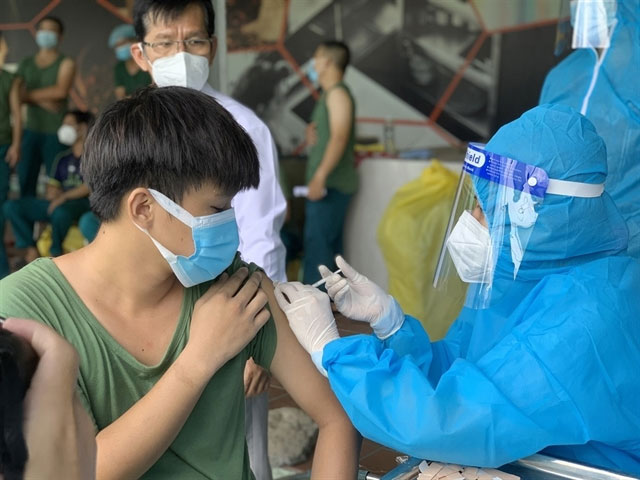The Ho Chi Minh City Department of Health has proposed administering the Covid-19 vaccine booster dose (third dose) for frontline workers and high-risk individuals during the last two months of 2021.
According to Associate Professor, Doctor Do Van Dung, Head of the Department of Public Health at Ho Chi Minh City University of Medicine and Pharmacy, it is reasonable to consider administering the booster dose (third dose) to the elderly, individuals with underlying health conditions, or those working in high-risk environments six months after completing the basic vaccination schedule (first two doses), provided that sufficient vaccines are available.
Enhancing Protection
Currently, several countries around the world have started administering the Covid-19 vaccine booster dose to enhance protection against new variants of the SARS-CoV-2 virus.

Administering Covid-19 vaccines to frontline workers in Thu Duc City, Ho Chi Minh City
Associate Professor Do Van Dung noted that some studies have shown that antibody levels in vaccinated individuals decrease by half after 108 days (approximately 15 weeks). After about 4-6 months post-vaccination, antibody levels decrease, and if exposed to SARS-CoV-2, individuals may contract the virus but will likely not experience severe illness.
Even though the illness may not be severe, the presence of the virus in the body can lead to transmission to others, thus increasing the potential for spread. Except for elderly individuals or those with underlying health conditions who have weakened immune systems, the vaccine’s protective efficacy is expected to prevent severe illness and death for at least the first six months.
“Research indicates that it is possible to administer the booster dose (third dose) using the same type of vaccine as the initial doses (first and second doses), such as Pfizer, Moderna, and AstraZeneca. However, due to anticipated difficulties in vaccine supply and based on immunological theories, some scientists are exploring the possibility of using different vaccines for the booster dose“, stated Associate Professor Do Van Dung.
Associate Professor, Doctor Phung Nguyen The Nguyen, Head of the Pediatrics Department at Ho Chi Minh City University of Medicine and Pharmacy and Head of the Covid-19 Treatment Unit at Children’s Hospital No. 1 (Ho Chi Minh City), mentioned that if the first two doses were AstraZeneca or another authorized vaccine, then Moderna or Pfizer could be administered for the third dose. For example, if the first dose is AstraZeneca and the second is Pfizer, or the first dose is Moderna and the second is Pfizer, the third dose can also be a mix of these two vaccines (as mixing these vaccines is currently permitted).
The Need for a Third Dose
“Recent noteworthy information from Israel regarding vaccination for the elderly shows that individuals vaccinated in January and July 2021 had double the risk of severe illness compared to those vaccinated more recently. This indicates that administering the third dose for the elderly after 4-6 months is necessary” , stated Associate Professor Do Van Dung.
However, Associate Professor Do Van Dung emphasized that the administration of the third booster dose should also consider vaccine availability. If there are still many elderly individuals in various localities across the country who have not received their second dose, priority should be given to vaccinating these individuals before proceeding with the third dose for the elderly, high-risk individuals, and frontline workers in Ho Chi Minh City.
According to Associate Professor Phung Nguyen The Nguyen, the potential reactions after receiving the third Covid-19 vaccine dose may include common reactions such as pain at the injection site, headache, nausea, fatigue, chills, and fever… and may also include rare reactions such as anaphylaxis or allergies. Therefore, vaccination facilities must ensure they are equipped to handle any shock-related incidents.
In addition to safety regulations for vaccination, recipients need to undergo screening similar to the first two doses. Vaccination sites should be arranged to ensure social distancing; after vaccination, individuals should remain at the site for at least 30 minutes to be monitored and advised by healthcare personnel. They should immediately inform healthcare staff if they experience any unusual symptoms (such as discomfort, nausea, rash, or swelling at the injection site).
“At home, individuals should monitor their body temperature, use a thermometer if fever occurs, take antipyretics as directed, and observe their response to the medication. Signs of concern include: high fever above 39 degrees Celsius, difficulty reducing fever, or fever lasting more than 24 hours; seizures; rash; severe discomfort or agitation; lethargy; difficulty breathing; or any other unusual health symptoms, in which case they should seek medical attention immediately”, advised Associate Professor Phung Nguyen The Nguyen.
Associate Professor Do Van Dung believes that for the elderly and individuals with underlying health conditions, the vaccine’s effectiveness in preventing severe outcomes from Covid-19 will decrease over time; in cases using vaccines with lower effectiveness, the ability to maintain immunity may be poor. Therefore, these individuals should be prioritized for the third vaccine dose.


















































